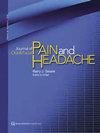Sphenopalatine Ganglion Block with Botulinum Neurotoxin for Treating Trigeminal Neuralgia Using CAD/CAM-Derived Injection Guide.
IF 1.9
3区 医学
Q2 DENTISTRY, ORAL SURGERY & MEDICINE
引用次数: 5
Abstract
AIMS To examine the effectiveness and safety of using a CAD/CAM-derived injection guide for botulinum neurotoxin block of the sphenopalatine ganglion for trigeminal neuralgia treatment. METHODS Ten patients with second-division trigeminal neuralgia who did not respond to submucosal administration of botulinum neurotoxin were enrolled in this study. The target point around the sphenopalatine fossa was determined after fusion of computed tomography data with a scan of a maxillary model using a software program for dental implant surgery. A CAD/CAM-derived injection guide was fabricated. The guide was affixed to the patient's maxilla, and a needle was inserted to an exactly analyzed depth. Subsequently, 50 units of botulinum neurotoxin were injected. Pain intensity evaluated using a visual analog scale and pain frequency were measured. RESULTS By using the guides, sphenopalatine ganglion block with botulinum toxin was performed 18 times without any complications. The visual analog scale score (8.1 ± 1.0) and pain frequency (19.4 ± 8.8 times/day) decreased (to 1.9 ± 1.4 and 4.9 ± 5.4 times/day, respectively) significantly (P < .001). After 4 weeks, the mean subjective improvement achieved was 77.5% ± 13.8%, and all patients responded to treatment. CONCLUSION Even without prior experience of sphenopalatine ganglion block, the CAD/CAM-derived guide enabled the accurate and safe administration of botulinum neurotoxin to the sphenopalatine ganglion for the treatment of trigeminal neuralgia.肉毒毒素阻断蝶腭神经节治疗三叉神经痛的CAD/ cam注射指南。
目的探讨应用CAD/ cam衍生注射指南进行蝶帕神经节肉毒毒素阻滞治疗三叉神经痛的有效性和安全性。方法选取10例黏膜下给药肉毒杆菌神经毒素无效的三叉神经痛患者作为研究对象。蝶腭窝周围的目标点是在使用种植牙手术软件程序将计算机断层扫描数据与上颌模型扫描融合后确定的。制作了CAD/ cam衍生的注射导管。将导针固定在患者的上颌骨上,并将针插入精确分析的深度。随后,注射50单位肉毒杆菌神经毒素。采用视觉模拟量表评估疼痛强度,并测量疼痛频率。结果应用该指南行蝶腭神经节肉毒毒素阻滞18次,无并发症发生。视觉模拟评分(8.1±1.0)和疼痛频率(19.4±8.8次/d)显著降低(分别为1.9±1.4次/d和4.9±5.4次/d) (P < 0.001)。4周后,平均主观改善率为77.5%±13.8%,所有患者均对治疗有反应。结论:即使没有蝶腭神经节阻滞的经验,CAD/ cam衍生的指南也能准确、安全地将肉毒杆菌神经毒素注射到蝶腭神经节治疗三叉神经痛。
本文章由计算机程序翻译,如有差异,请以英文原文为准。
求助全文
约1分钟内获得全文
求助全文
来源期刊

Journal of Oral & Facial Pain and Headache
DENTISTRY, ORAL SURGERY & MEDICINE-
CiteScore
5.10
自引率
4.00%
发文量
18
期刊介绍:
Founded upon sound scientific principles, this journal continues to make important contributions that strongly influence the work of dental and medical professionals involved in treating oral and facial pain, including temporomandibular disorders, and headache. In addition to providing timely scientific research and clinical articles, the journal presents diagnostic techniques and treatment therapies for oral and facial pain, headache, mandibular dysfunction, and occlusion and covers pharmacology, physical therapy, surgery, and other pain-management methods.
 求助内容:
求助内容: 应助结果提醒方式:
应助结果提醒方式:


